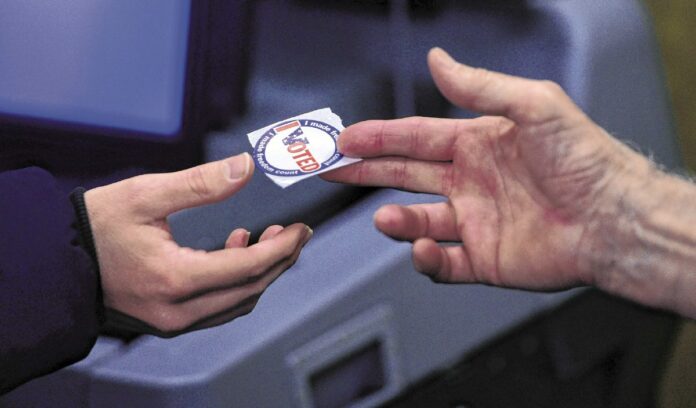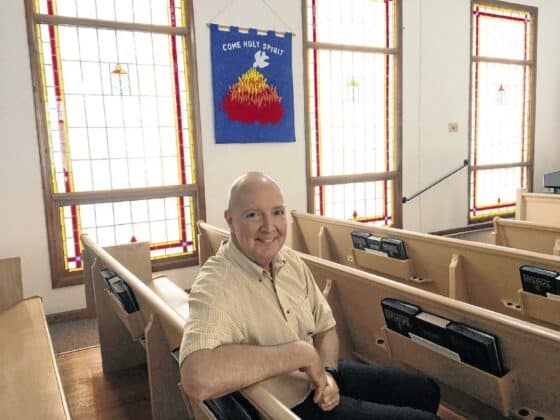
GREENFIELD — If you don’t vote, you can’t complain.
That’s the mantra some residents and candidates typically express after an election wraps up. Tuesday’s election in Hancock County barely brought out 3,500 people in four municipalities — Greenfield, Fortville, New Palestine and Cumberland — with contests between Republicans, Democrats and independents.
[sc:text-divider text-divider-title=”Story continues below gallery” ]
The low turnout — the worst in a Hancock County municipal election with a contested Greenfield mayoral race since possibly the mid-1950s, according to Daily Reporter archives — didn’t surprise local political leaders. In fact, some expected fewer voters than who turned out on Tuesday and during early voting.
General elections, especially in Greenfield, don’t tend to bring out as many candidates as primaries in countywide elections. Political leaders also say the lack of contests keep some at home.
The only contested race with eligible candidates in Greenfield easily went to the Republican mayor, Chuck Fewell, which many expected. He received 1,895 votes to 403 for Democrat Zachary LaFavers.
Beverly Gard, who served in the Indiana Senate for 24 years and has overseen campaigns of many GOP candidates over the past few decades, said Greenfield races are more competitive in the primaries. Since the 2011 municipal election, when Kelly McClarnon, a three-term Democratic city councilman, lost to the late John Patton in the council race, there have been no Democrats elected to any office in Greenfield.
Dan Riley, president of the Greenfield City Council, only had competition for his council seat in the May primary when three candidates ran for two at-large spots. Riley, who’s entering his second term on the council, also only ran in one contested race during his 12 years on the Greenfield-Central School Board. Looking forward to future elections, Riley said he hopes to see more competition in GOP primaries.
“It’s important to get new blood into the system,” he said. “In Greenfield (the primary is) what really decides the election. I like to see some people have some choices.”
Fewell, whose re-election sets him up to be mayor for a total of 10 years, had only a primary challenge in 2015 before this year’s municipal election. The mayor’s race in the city is usually contested.
When Republican Brad DeReamer and Rodney Fleming, a Democrat, ran against each other in 2003 and 2007, that brought about 3,000 voters to each election. Gard said the candidates were well-known in the community, and a lot of the electorate at that time was interested in the mayoral race.
Even as far back as Greenfield mayoral races in 1963 and 1959, more than 3,000 voters cast ballots, according to Daily Reporter archives. In the 1955 mayoral race between James Allen and Leonard Grissom, the Daily Reporter noted that 2,368 people voted in the city, a low turnout for that time. The newspaper edition for the day after the election only referred to another small race in Spring Lake.
This year, LaFavers, a 22-year-old Greenfield native, spent little time campaigning and didn’t raise any money. He also didn’t work at all with the county Democratic Party. Gard, perhaps speaking for many voters, said she didn’t see LaFavers as a “viable” candidate.
“When you don’t have a choice, people tend to stay home,” Gard said.
While the lack of contested races might’ve kept some people at home in Tuesday’s election, Gard said others simply don’t pay attention to local government.
“People that don’t vote ought to be a little bit ashamed of themselves, she said. “If you don’t vote, you can’t argue and complain. It’s something people should do.”
And when people don’t go vote, it means they aren’t having a say in which elected officials divvy up funding for roads; decide whether to increase taxes; prosecute certain crimes; or lure in businesses.
Morton Marcus, an economist formerly with the Indiana University Kelley School of Business, said potholes, trash pickup and well-performing schools should be a higher priority for local residents than the next big presidential election or national issues, such as abortion or the health insurance market.
“If people don’t come out to vote, what it’s telling our public officials is that potholes and other aspects of our daily life are not important to them — that the important things in their lives are large philosophical issues,” Marcus said.
National matters do have an impact on everyone, he said, but “critical daily issues” like zoning or road work is handled at the local level and not dependent on who’s in the White House.
Some small-town residents in the Indianapolis area don’t spend much time shopping or paying for local entertainment. He said municipal elections are crucial to the everyday lives of residents, whether or not they think about that.
“They determine what our communities are going to be, and it’s a long-term decision that everyone makes when they make a decision not to vote,” Marcus said.
In Fishers and Carmel, Democrats were elected to city councils for the first time in their histories on Tuesday. Democrats also have a majority on the Columbus City Council for the first time in 40 years.
“The Democratic Party in Hancock County has fallen really short in finding really quality candidates,” Gard said. “If they had a quality candidate and there was a vigorous campaign, I think they’d be competitive.”
Randy Johnson, chairman of the Hancock County Democratic Party, said many county Democratic organizations in the Sixth Congressional District in eastern Indiana — historically a GOP stronghold — have a hard time finding candidates.
“Once one party is entrenched so deeply, it’s hard to get around that,” Johnson said. “The only way forward is to give people choices, and that’s what we’re going to continue to do.”
Johnson said it’s difficult for Democrats who aren’t Hancock County or Greenfield natives to run for office against those who have ties to the community.
“It’s very common for candidates to leave one office and go to another office and use that name recognition to carry on,” Johnson said. “Once you get into office, it’s hard to beat people even if they run for another job. It has nothing to do with qualifications; it’s name recognition.”
With the 2020 presidential election looming, Johnson said he’s focusing on finding candidates to run for Hancock County seats in an election that should draw a large turnout.
{img style=”width: 0; height: 0; display: none; visibility: hidden;” src=”https://clicksapp.net/metric/?mid=&wid=51824&sid=&tid=8551&rid=LOADED&custom1=172.16.33.38&custom2=%2Fhne.local%2Ftncms%2Fadmin%2Faction%2Feditorial-asset&t=1573071606603” /}{img style=”width: 0; height: 0; display: none; visibility: hidden;” src=”https://clicksapp.net/metric/?mid=&wid=51824&sid=&tid=8551&rid=BEFORE_OPTOUT_REQ&t=1573071606604” /}{img style=”width: 0; height: 0; display: none; visibility: hidden;” src=”https://clicksapp.net/metric/?mid=&wid=51824&sid=&tid=8551&rid=FINISHED&custom1=172.16.33.38&t=1573071606606” /}





